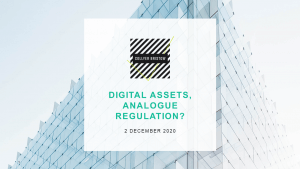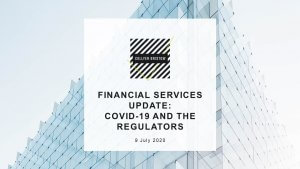- FinTech
- Banking & financial disputes
- Financial regulatory
- Financial services

Longer Reads
An update of the latest developments in crypto regulations
3 minute read
Published 11 March 2020
Key information
- Specialisms
- Business
- Sectors
- Financial services
How to classify and regulate cryptoassets?
The debate around the regulatory classification of “major” cryptocurrencies such as Bitcoin, Ether, Litecoin has been raging for years. The key issue is whether they should be classified at all and if so as what? We have used the term digital assets to cover both cryptocurrencies and also tokens issued through Initial Coin Offerings.
In the U.S., the Commodity Futures Trading Commissions has recognised Bitcoin as a commodity, and permitted its trading on some derivatives exchanges, such as the Chicago Board of Options Exchange. The U.S. treasury, as well as the European Central Bank, classify Bitcoin and similar cryptocurrencies as a convertible decentralised virtual currency. The Bank of Israel has adopted a completely different approach and has suggested that Bitcoin should be viewed as a financial asset.
Cryptocurrencies do not fit within the usual legal definition of a currency as no official body stands behind them. In addition, when it comes to the economic parameters of any currency, a critical element is the measure of confidence that users have in it. This confidence is derived from the fact that the currency is legal tender with legal backing from a state. None of these conditions exist with Bitcoin or similar virtual currencies, which are characterised by higher volatility and a lack of certainty regarding the parties that stand behind them.[1] Having said that lack of confidence and higher volatility are not confined merely to cryptocurrencies. Such characteristics are also common to some of the world’s most volatile currencies (for example the Venezualan bolivar or the Zimbabwean Dollar).
Regulation and the legal status of cryptoassets in the UK
The UK launched the Cryptoassets Taskforce (the “Taskforce”) in March 2018, consisting of HM Treasury, the Financial conduct Authority (FCA) and the Bank of England. In particular, the government has set out an ambition for the UK to be the world’s most innovative economy.[2]
The Report[3] published by the Taskforce, provides that the government is developing a robust regulatory framework with the goal to bring all relevant firms into anti-money laundering regulation, as well as considers the impact of a distributed ledger technology (DLT) and cryptocurrencies on financial services.
Following the publication of the Report, the Financial Conduct Authority (the “FCA”) published a Guidance on Cryptoassets (PS19/22, July 2019), as well as updated its website to reflect the following. The FCA has divided all cryptoassets into two broad categories: a) regulated tokens (paragraph 2 of the Guidance), and b) unregulated tokens (paragraph 3 of the Guidance).
The first category includes:
i) Security tokens: these would usually provide various rights such as ownership, repayment of a specific sum of money, or entitlement to a share in future profits. These rights amount to a “specified investment” under the Financial Services and Markets Act (2000) (Regulated Activities) Order 2001 (the “RAO”), so would be regulated by the FCA as a “security”. Alternatively, these may be transferable securities or other financial instrument under the EU’s Markets in Financial Instruments Directive II (MiFID II); and
ii) E-Money Tokens that meet the definition of e-money under the Electronic Money Regulations.
The second, unregulated, category consists of:
i) Payment or Exchange Tokens, which are various cryptocurrencies, such as Bitcoin, Litecoin and equivalents;
ii) Utility Tokens: these can be exchanged for a specific product or service; and
iii) any tokens, which are not security tokens or e-money tokens.
Such guidance has been welcomed by the market players as provided some clarity on the application of the RAO and MiFID II to various types of tokens as participants need to be clear on whether their activities require the FCA’s authorisation. Having said that, Taskforce has admitted in its Report that some cryptoassets are of a “novel nature”, meaning that we can expect many practical issues to flow from work done to date.
From a legal as opposed to regulatory perspective, there has been a significant development recently as the High Court has held that cryptocurrencies are property under English law (AA v Persons Unknown [2019] EWHC 3556 (Comm)). This is the first time the court has analysed the status of cryptocurrencies in depth (unlike in some previous similar cases) following the UK Jurisdiction Task Force’s Legal Statement on Crypto Assets and Smart Contracts. We have already reported on the case referred to above and the Legal Statement in detail here.
There was a potential obstacle in treating Bitcoin and cryptocurrency as a form of property as they are neither physical things (choses in possession) but rather virtual, not tangible and cannot be possessed, nor are they legal rights (choses in action) as they are not a right capable of being enforced. However, in his judgement, Mr Justice Bryan adopted the recommendations made in the Legal Statement (paragraphs 71 – 88) that more modern legal authorities have accepted that the law may recognise forms of property other than choses in action and choses in possession.
Other challenges
There have been longstanding concerns that cryptocurrencies present opportunities to terrorists and money launderers. In response, creative Regtech firms are now offering highly technological solutions allowing recipients to trace the origins of their money and to mitigate the risks to consumers and preserve market integrity.
Ensuring high regulatory standards in the Digital Assets should help provide confidence and transparency, especially when linked to blockchains / distributed ledger technology or ”DLT”.
Blockchain technology has been attracting a lot of attention recently as it has the potential to provide significant value in various sectors ranging from property and financial services to the art world. At the same time, authorities remain cautious about the use of DLT due to the fact that it removes the need for a central authority.
From a legal point of view, there is the issue of jurisdiction (among other things) in respect of cryptoassets, which remains to be tested in court. Interestingly, Mr Justice Bryan (in AA v Persons Unknown [2019] EWHC 3556 (Comm)) granted permission for the claimant to serve the claim form outside the jurisdiction. He also allowed the claimant to serve the third and fourth defendants by email (given the exceptional circumstances, i.e. the potential ease of dissipation of the bitcoins).
Comment
The High Court judgement that cryptocurrencies are property under English law will lead to important consequences in respect of the application of a number of English laws, such as those relating to the vesting of property in personal bankruptcy, succession on death, in matters of theft/fraud, the rights of liquidators or administrators in corporate insolvency, etc.
Digital assets cannot easily be fit into the regulatory perimeter making the establishment of international standards for a cryptoasset-related activity a challenging task. Nonetheless, some improvements can certainly be made in certain problematic areas by addressing the risks of money-laundering and other illicit activities. In particular, on 24 January 2020, following extensive consultation the World Economic Forum announced the first global consortium for digital currency governance (including stablecoins). The consortium includes public-private cooperation across developed and high growth markets by bringing together governments, financial institutions, firms, and technical experts in order to create a framework governing digital currencies.
Related content
Longer Reads
An update of the latest developments in crypto regulations
Published 11 March 2020
Associated sectors / services
Authors
How to classify and regulate cryptoassets?
The debate around the regulatory classification of “major” cryptocurrencies such as Bitcoin, Ether, Litecoin has been raging for years. The key issue is whether they should be classified at all and if so as what? We have used the term digital assets to cover both cryptocurrencies and also tokens issued through Initial Coin Offerings.
In the U.S., the Commodity Futures Trading Commissions has recognised Bitcoin as a commodity, and permitted its trading on some derivatives exchanges, such as the Chicago Board of Options Exchange. The U.S. treasury, as well as the European Central Bank, classify Bitcoin and similar cryptocurrencies as a convertible decentralised virtual currency. The Bank of Israel has adopted a completely different approach and has suggested that Bitcoin should be viewed as a financial asset.
Cryptocurrencies do not fit within the usual legal definition of a currency as no official body stands behind them. In addition, when it comes to the economic parameters of any currency, a critical element is the measure of confidence that users have in it. This confidence is derived from the fact that the currency is legal tender with legal backing from a state. None of these conditions exist with Bitcoin or similar virtual currencies, which are characterised by higher volatility and a lack of certainty regarding the parties that stand behind them.[1] Having said that lack of confidence and higher volatility are not confined merely to cryptocurrencies. Such characteristics are also common to some of the world’s most volatile currencies (for example the Venezualan bolivar or the Zimbabwean Dollar).
Regulation and the legal status of cryptoassets in the UK
The UK launched the Cryptoassets Taskforce (the “Taskforce”) in March 2018, consisting of HM Treasury, the Financial conduct Authority (FCA) and the Bank of England. In particular, the government has set out an ambition for the UK to be the world’s most innovative economy.[2]
The Report[3] published by the Taskforce, provides that the government is developing a robust regulatory framework with the goal to bring all relevant firms into anti-money laundering regulation, as well as considers the impact of a distributed ledger technology (DLT) and cryptocurrencies on financial services.
Following the publication of the Report, the Financial Conduct Authority (the “FCA”) published a Guidance on Cryptoassets (PS19/22, July 2019), as well as updated its website to reflect the following. The FCA has divided all cryptoassets into two broad categories: a) regulated tokens (paragraph 2 of the Guidance), and b) unregulated tokens (paragraph 3 of the Guidance).
The first category includes:
i) Security tokens: these would usually provide various rights such as ownership, repayment of a specific sum of money, or entitlement to a share in future profits. These rights amount to a “specified investment” under the Financial Services and Markets Act (2000) (Regulated Activities) Order 2001 (the “RAO”), so would be regulated by the FCA as a “security”. Alternatively, these may be transferable securities or other financial instrument under the EU’s Markets in Financial Instruments Directive II (MiFID II); and
ii) E-Money Tokens that meet the definition of e-money under the Electronic Money Regulations.
The second, unregulated, category consists of:
i) Payment or Exchange Tokens, which are various cryptocurrencies, such as Bitcoin, Litecoin and equivalents;
ii) Utility Tokens: these can be exchanged for a specific product or service; and
iii) any tokens, which are not security tokens or e-money tokens.
Such guidance has been welcomed by the market players as provided some clarity on the application of the RAO and MiFID II to various types of tokens as participants need to be clear on whether their activities require the FCA’s authorisation. Having said that, Taskforce has admitted in its Report that some cryptoassets are of a “novel nature”, meaning that we can expect many practical issues to flow from work done to date.
From a legal as opposed to regulatory perspective, there has been a significant development recently as the High Court has held that cryptocurrencies are property under English law (AA v Persons Unknown [2019] EWHC 3556 (Comm)). This is the first time the court has analysed the status of cryptocurrencies in depth (unlike in some previous similar cases) following the UK Jurisdiction Task Force’s Legal Statement on Crypto Assets and Smart Contracts. We have already reported on the case referred to above and the Legal Statement in detail here.
There was a potential obstacle in treating Bitcoin and cryptocurrency as a form of property as they are neither physical things (choses in possession) but rather virtual, not tangible and cannot be possessed, nor are they legal rights (choses in action) as they are not a right capable of being enforced. However, in his judgement, Mr Justice Bryan adopted the recommendations made in the Legal Statement (paragraphs 71 – 88) that more modern legal authorities have accepted that the law may recognise forms of property other than choses in action and choses in possession.
Other challenges
There have been longstanding concerns that cryptocurrencies present opportunities to terrorists and money launderers. In response, creative Regtech firms are now offering highly technological solutions allowing recipients to trace the origins of their money and to mitigate the risks to consumers and preserve market integrity.
Ensuring high regulatory standards in the Digital Assets should help provide confidence and transparency, especially when linked to blockchains / distributed ledger technology or ”DLT”.
Blockchain technology has been attracting a lot of attention recently as it has the potential to provide significant value in various sectors ranging from property and financial services to the art world. At the same time, authorities remain cautious about the use of DLT due to the fact that it removes the need for a central authority.
From a legal point of view, there is the issue of jurisdiction (among other things) in respect of cryptoassets, which remains to be tested in court. Interestingly, Mr Justice Bryan (in AA v Persons Unknown [2019] EWHC 3556 (Comm)) granted permission for the claimant to serve the claim form outside the jurisdiction. He also allowed the claimant to serve the third and fourth defendants by email (given the exceptional circumstances, i.e. the potential ease of dissipation of the bitcoins).
Comment
The High Court judgement that cryptocurrencies are property under English law will lead to important consequences in respect of the application of a number of English laws, such as those relating to the vesting of property in personal bankruptcy, succession on death, in matters of theft/fraud, the rights of liquidators or administrators in corporate insolvency, etc.
Digital assets cannot easily be fit into the regulatory perimeter making the establishment of international standards for a cryptoasset-related activity a challenging task. Nonetheless, some improvements can certainly be made in certain problematic areas by addressing the risks of money-laundering and other illicit activities. In particular, on 24 January 2020, following extensive consultation the World Economic Forum announced the first global consortium for digital currency governance (including stablecoins). The consortium includes public-private cooperation across developed and high growth markets by bringing together governments, financial institutions, firms, and technical experts in order to create a framework governing digital currencies.
Associated sectors / services
- FinTech
- Banking & financial disputes
- Financial regulatory
- Financial services
Authors
Need some more information? Make an enquiry below.
Subscribe
Please add your details and your areas of interest below
Article contributors
Nigel
BrahamsPartner - Head of Financial Services
Specialising in Corporate, Commercial, Digital, Financial regulatory and Private equityValentina
FalichevaAssociate
Specialising in Corporate, Commercial, Corporate recovery, restructuring & insolvency, Manufacturing and Private equity
Enjoy reading our articles? why not subscribe to notifications so you’ll never miss one?
Subscribe to our articlesMessage us on WhatsApp (calling not available)
Please note that Collyer Bristow provides this service during office hours for general information and enquiries only and that no legal or other professional advice will be provided over the WhatsApp platform. Please also note that if you choose to use this platform your personal data is likely to be processed outside the UK and EEA, including in the US. Appropriate legal or other professional opinion should be taken before taking or omitting to take any action in respect of any specific problem. Collyer Bristow LLP accepts no liability for any loss or damage which may arise from reliance on information provided. All information will be deleted immediately upon completion of a conversation.
Close











































































